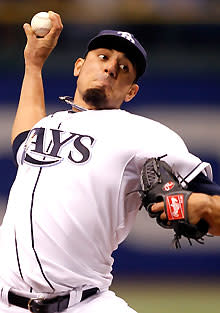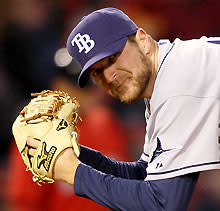Rays' rotation redefines quality starts
ANAHEIM, Calif. – On a warm evening in mid-April, the best emerging rotation in baseball established its ground rules.
At a table for five at Grill 23 in Boston, amid mahogany and brass and $46 steaks, James Shields(notes), Matt Garza(notes), David Price(notes), Jeff Niemann(notes) and Wade Davis(notes) of the Tampa Bay Rays toasted to these ideals.
They would pitch deep into games. They would pitch off their fastballs. They would seek outs in the strike zone. They would believe in their defense. They would be fit and strong and coachable and accountable. They would remind each other it was great to be young and strong and Rays. They would ignore the common definition of a "quality" start. And they would have fun.
"The tightness that we have is an amazing thing," Shields said Tuesday night, hours before Niemann would pitch into the eighth inning against the Los Angeles Angels to bring their combined output to 19-5 with a 2.58 ERA. "I'm loving every minute. I'm having so much fun."
At a cost of $8.3 million to their budget-conscious franchise, they are through six weeks leading the American League in wins, ERA, innings pitched, quality starts (common definition), WHIP and batting average against. Their average age is just this side of 26. The slightest among them – Garza, the only one developed outside the organization – is 6-foot-4, 215 pounds. They throw hard – Niemann, at a sizeable 6-foot-9, 260 pounds, has the shortest fastball, tumbling in at 92 mph. They hail from Tennessee (Price), Southern California (Shields), central California (Garza), Texas (Niemann) and Florida (Davis). Covering drafts from 2000 to 2007, three – Garza, Niemann and Price – are first-round selections.
What binds them is The Process, born in late 2005 to a previously listless organization and set forth by rookie GM Andrew Friedman and his first-time manager Joe Maddon. The philosophy was not new to the game or even to the Rays. Their dedication to it was, at least for them.
"I want all of our pitchers – now and going forward – to be fastball-command pitchers first," Maddon said then, and ever since, and repeats today. "They must throw a fastball for a strike when they want to. That subgroup that throws breaking balls first, that hopes to trick hitters, they don't last. The guys who pitch off their fastball first, they pitch well and they pitch for many years. What do our guys have in common? They hear that from me."
In the American League East, where the behemoths build their rotations around veterans, and often enough acquire or maintain them with very large semi-monthly checks – CC Sabathia(notes), A.J. Burnett(notes), Andy Pettitte(notes), John Lackey(notes), Josh Beckett(notes) and Daisuke Matsuzaka(notes) dominate staffs and payrolls in New York and Boston – the Rays turned years of itinerant strategies (and, subsequently, last-place finishes) into a system that drafted well, developed well and presented well.
Paired with a roster of athletic position players, and covering for an adequate but potentially problematic bullpen, the starting rotation has driven the Rays to their 23-10 record, best in baseball. In those 33 starts, the Rays' starter has pitched farther into the game than the opposite starter 22 times. In the past 15 games, the opposing starter has gone longer only three times. One of the three was Dallas Braden's(notes) perfect game.
For the most part, the five Rays have kept their pitch counts manageable, winning the nightly battle of attrition. They do that with fastballs. According to fangraphs.com, only Shields throws fewer than 69 percent fastballs. But, then, even with one of the better changeups in the game, he still loads up on the fastball half the time.
"We're not trying to fool anybody," said the rookie, Davis, who in six starts has drawn Sabathia, Beckett, Mark Buehrle(notes), Zack Greinke(notes) and Ben Sheets(notes) twice, and has three wins. "Here comes the fastball. We're going to pitch off that."
The game changed in St. Petersburg two seasons ago, when an untested rotation (Shields, then 26, was the de facto ace, Garza had spent his first full year in the big leagues) and a rebuilt bullpen (Price came up in mid-September and got important late outs) found itself 31 wins better than the season before and in the World Series. Suddenly, to development and presentation, the Rays had added October perspective and tenacity. Pitchers now come through the system not to endure their ends of another 100-loss season, but to contribute to the momentum. There is a standard. In the land of giants – the AL East – Rays pitchers are assigned rocks and slingshots and told to have at it.
"Certainly, the bar has been raised in this organization," said Jim Hickey, the pitching coach, who, for four seasons, has shepherded young men and new goals. "The expectations are astronomic compared to what they were just two years ago.
"A guy like Wade Davis comes in knowing this is not tryout time. It's go time. And it's time to produce. It's a whole different culture."
While similar in their size, their approach and, for the moment, their results, the starting five does go its separate ways.
Maddon's take on …
• David Price.
"He wants to be great. He's not satisfied with being good. But, with him, I don't think great is the enemy of good. And he has a great sense of humor."
• James Shields.
"The ultimate competitor. He's never satisfied. He wants nine innings every day. He takes pride in his conditioning and never wants to come out."
• Wade Davis.
"He's kind of like he looks. That intense glare. Doesn't say much. He's feeling his way through. The fastball command is coming. Him and David Price have the farthest to go as far as fastball command. When they do, heads up."
• Jeff Niemann.
"Last year, he was hanging on by his fingernails. The injury [shoulder surgery in 2005] he had to come back from. He's possibly the best strike-thrower on the group. He has the most weapons, but controls all of them."
• Matt Garza.
"Garza comes from the Planet Garzy, what can I say? He is different. He's so competitive and a perfectionist. Being competitive and being great can be interfered with when you're a perfectionist, because of the emotions involved and the anger. You can't let the wish for perfection cloud your thinking in the midst of an event. He walks the line."
Garza leads the AL with five wins (Shields and Price each have four). Price, the lone lefty, is fourth in ERA (Niemann and Garza also are in the top 10). Collectively, they are first.
They'd like to pitch 1,000 innings among them. They believe 23-10 is a decent start, but could have been better.
These are the principles they believe in. They are what they toasted to.
"If you're not getting stuff done that you need to get done, you're going to be left behind," Shields said. "Nobody wants to be the weak link."



